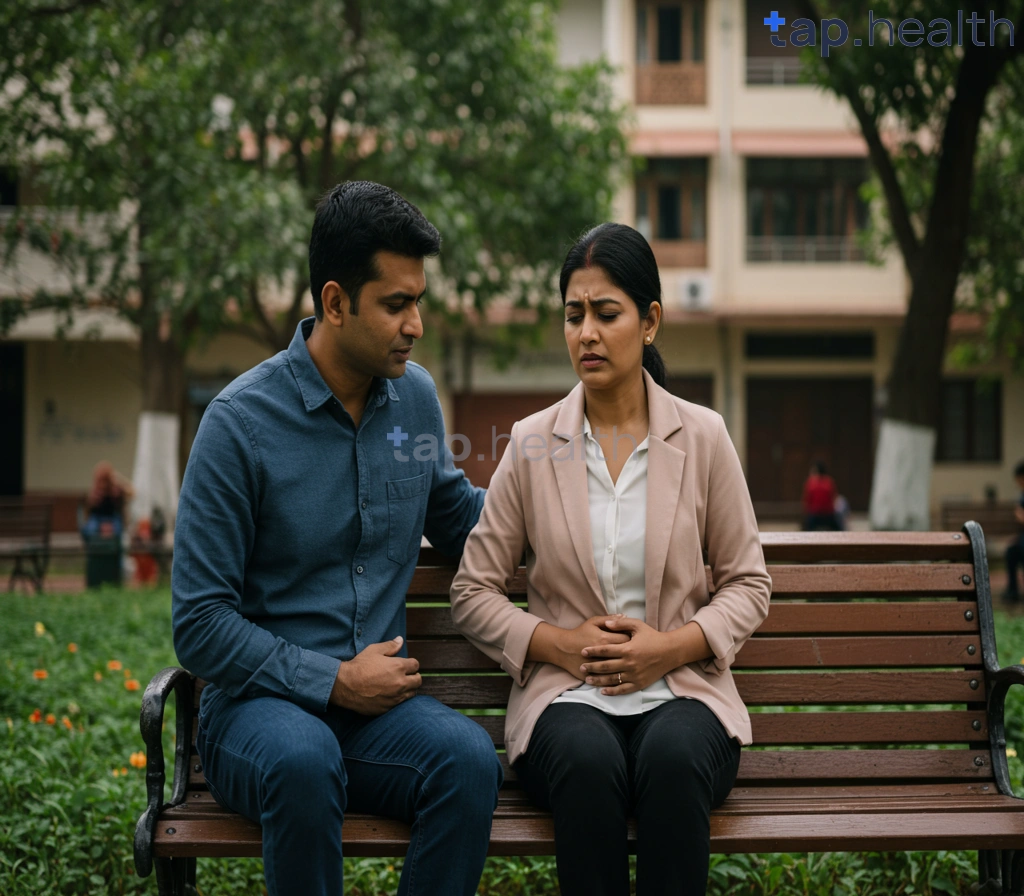Table of Contents
- Diabetes & Diarrhea: When to See a Doctor?
- Diarrhea and Diabetes: Recognizing Serious Symptoms
- Is Your Diarrhea Diabetes-Related? A Guide to Treatment
- Managing Diabetic Diarrhea: Prevention and Emergency Care
- Diabetes-Related Diarrhea: Urgent vs. Non-Urgent Symptoms
- Frequently Asked Questions
- References
Experiencing both diabetes and diarrhea can be alarming, leaving you wondering when a simple stomach upset turns into something more serious. This is a common concern, and understanding the nuances of this combination is crucial for managing your health effectively. This blog post addresses the important question: Diabetes and Diarrhea: When Should You Seek Medical Attention? We’ll explore the connections between these two conditions, discuss warning signs to watch out for, and help you determine when professional medical advice is absolutely necessary. Let’s delve into the information you need to feel confident and in control.
Diabetes & Diarrhea: When to See a Doctor?
Diarrhea, while a common ailment, can be particularly concerning for individuals with diabetes. The combination can lead to dangerous complications, especially in hot and humid climates prevalent across many Indian and tropical countries. Dehydration, a significant risk with both conditions, is exacerbated by the increased fluid loss from diarrhea. This is further complicated by the fact that diabetes can impair kidney function, already increasing the risk of complications. Nearly 30% of people with diabetes develop diabetic nephropathy, a type of kidney disease. This makes managing fluid balance even more critical. Understanding the early signs of diabetes is crucial for prevention and management; you can learn more about them in our blog on 10 Early Signs and Symptoms of Diabetes? – Tap Health.
Recognizing Warning Signs
Persistent diarrhea lasting more than 24-48 hours is a serious cause for concern. Look out for severe dehydration symptoms like excessive thirst, dizziness, dark urine, and decreased urination. If you experience blood in your stool, severe abdominal pain, or high fever alongside diarrhea, seek immediate medical attention. These could indicate more serious underlying issues. The prevalence of infectious diseases in tropical regions further emphasizes the need for prompt medical evaluation.
When to Seek Help
For people with diabetes in India and other tropical countries, even seemingly mild diarrhea warrants careful monitoring. Don’t hesitate to contact your doctor if you’re experiencing persistent diarrhea, especially if you’re also experiencing any of the warning signs mentioned above. Early intervention can prevent serious complications and ensure better management of both your diabetes and your gastrointestinal health. Remember, prompt medical attention is crucial for protecting your kidneys and overall well-being. It’s also important to remember that diabetes can affect various bodily functions, and its impact on menstrual cycles is a common concern. For more information, read our article on Does Diabetes Affect Periods?.
Diarrhea and Diabetes: Recognizing Serious Symptoms
Diarrhea, characterized by loose, watery stools, can be a significant concern for individuals with diabetes, particularly in hot and humid climates prevalent across many Indian and tropical countries. The already delicate balance of blood sugar regulation can be further disrupted by dehydration and nutrient loss associated with prolonged diarrhea. This is especially crucial given that a staggering 50% of diabetes cases worldwide remain undiagnosed, according to the IDF Diabetes Atlas, meaning many individuals may be unknowingly vulnerable to complications. Understanding the relationship between diabetes and other health issues, such as obesity, is also crucial. For more information, read our article on Understanding the Link Between Diabetes and Obesity.
Recognizing Warning Signs
Persistent diarrhea lasting more than 24-48 hours, accompanied by symptoms like high fever, severe abdominal pain, bloody stools, or persistent vomiting, requires immediate medical attention. Dehydration is a major risk, particularly in warmer climates where fluid loss can rapidly escalate. In diabetics, dehydration can lead to hyperglycemia (high blood sugar) or ketoacidosis, a potentially life-threatening condition. Pay close attention to any unusual changes in your bowel habits, especially if you’ve recently experienced a change in your diet or medication.
Seeking Medical Help
In India and tropical regions, access to healthcare can vary. If you experience severe diarrhea alongside diabetes symptoms such as excessive thirst, frequent urination, blurred vision, or unexplained weight loss, do not delay seeking medical assistance. Prompt diagnosis and treatment are crucial to prevent severe complications. Early intervention can significantly improve outcomes and reduce the risk of long-term health issues. Remember, your health is paramount; don’t hesitate to contact your doctor or a local healthcare provider, especially if your symptoms are worsening. It’s also important to be aware of less common symptoms of diabetes, such as those discussed in our article on Can Diabetes Cause Loss of Taste and Smell?.
Is Your Diarrhea Diabetes-Related? A Guide to Treatment
Understanding the Connection
Diarrhea is a common symptom, but its appearance alongside diabetes warrants attention, especially in tropical and Indian climates where certain infections are more prevalent. While not a direct symptom of diabetes itself, diarrhea can be a complication or triggered by various factors related to the condition. For example, poorly managed blood sugar levels can lead to dehydration, increasing susceptibility to infections that cause diarrhea. Additionally, certain medications used to manage diabetes can have gastrointestinal side effects, including diarrhea. In children, the prevalence of diabetes, while relatively low at approximately 35 per 10,000 U.S. youths (source), still necessitates vigilance, as their immune systems may be less robust. It’s important to understand the underlying causes; is it a consequence of the diabetes itself, or perhaps something else entirely? Consider reading more about the potential causes of diabetes in our article: Is Diabetes Caused by a Virus or Bacteria?
When to Seek Medical Help
Persistent diarrhea lasting more than a few days, accompanied by severe abdominal pain, fever, blood in the stool, or signs of dehydration (such as excessive thirst, dizziness, or decreased urination) requires immediate medical attention. The risk of dehydration is particularly acute in hot and humid environments prevalent in many Indian and tropical countries. This is especially crucial for individuals with diabetes, as dehydration can exacerbate existing complications. Similarly, if you experience a sudden onset of severe diarrhea alongside changes in your blood sugar levels, seek medical advice immediately.
Regional Considerations & Next Steps
In regions with limited access to clean water and sanitation, the risk of infectious diarrhea is amplified. Maintaining good hygiene practices is crucial, especially for individuals with diabetes. If you’re experiencing diarrhea and have diabetes, don’t hesitate to consult a doctor or healthcare professional. Early diagnosis and treatment can prevent serious complications and improve your overall well-being. Prompt action is key to managing both your diabetes and any related complications efficiently. Planning a trip soon? Check out our guide on Traveling with Diabetes: Essential Tips for a Safe & Healthy Journey to ensure your travels are comfortable and safe.
Managing Diabetic Diarrhea: Prevention and Emergency Care
Understanding the Risks
Diarrhea in individuals with diabetes can be a serious complication, especially in hot and humid climates prevalent in many Indian and tropical countries. Dehydration poses a significant threat, potentially leading to severe health consequences. The already increased risk of sleep disorders in diabetes, a 70% higher chance of sleep apnea according to research, is further exacerbated by dehydration and electrolyte imbalance caused by persistent diarrhea. Prompt medical attention is crucial to manage both the immediate symptoms and the potential long-term effects on overall health. This is especially important as you age, and understanding the Managing Diabetes as You Age: Challenges and Solutions can help you proactively address such issues.
Prevention Strategies
Maintaining good blood sugar control is paramount in preventing diabetic diarrhea. This involves following a prescribed diet, regular medication adherence, and consistent monitoring of blood glucose levels. A balanced diet rich in fiber, but careful to avoid excessive amounts which can worsen diarrhea, is also key. In warmer climates, staying well-hydrated is vital, emphasizing clean drinking water to prevent infections that could trigger diarrhea. Regular handwashing is also essential to prevent the spread of infectious agents. Following a proper Diet Chart for Diabetic Patients to Control Diabetes can significantly contribute to preventing such complications.
Emergency Care
If diarrhea persists for more than 24 hours, is accompanied by high fever, severe abdominal pain, or bloody stools, seek immediate medical attention. Dehydration can rapidly progress, especially in tropical regions, leading to serious complications. Oral rehydration solutions (ORS) can help replenish lost fluids and electrolytes, but if you are unable to keep fluids down, immediate medical intervention is necessary. In India and other tropical countries, access to appropriate healthcare varies; it’s crucial to identify nearby facilities equipped to handle diabetic emergencies.
Diabetes-Related Diarrhea: Urgent vs. Non-Urgent Symptoms
Diarrhea is common, but for people with diabetes it can pose additional risks—especially since diabetes prevalence is higher in urban India (12.1%) compared to rural areas (8.3%). Knowing when diarrhea is a minor issue versus when it requires urgent care is essential for safe diabetes management.
Non-Urgent Symptoms
Not all cases of diarrhea are dangerous. Many are mild and manageable at home:
-
Occasional loose stools
-
Mild abdominal discomfort
-
No major disruption to blood sugar control
If symptoms are mild:
-
Stay hydrated with oral rehydration solutions (ORS)
-
Eat bland foods like rice, bananas, or plain toast
-
Monitor your blood glucose closely
⚠️ However, persistent diarrhea—even if mild—should not be ignored. If it lasts more than a couple of days, consult your doctor. Remember, blood sugar swings can worsen diarrhea, and in turn, diarrhea can make blood sugar harder to manage. (Learn more in our guide: Why Does Diabetes Make You Hungry?)
Urgent Symptoms: When to Seek Immediate Help
Some signs indicate a medical emergency. Call your doctor or go to the nearest clinic if you experience:
-
Severe, persistent diarrhea leading to dehydration (dizziness, dry mouth, reduced urination)
-
Bloody or black stools
-
High fever
-
Severe abdominal pain
-
Rapid, unexplained weight loss
-
Inability to manage blood sugar despite usual treatment
These symptoms could point to a serious underlying condition such as diabetic ketoacidosis (DKA)—a life-threatening complication that requires urgent care.
Key Takeaway
-
Mild diarrhea: Try home care + monitor blood sugar closely.
-
Persistent or severe diarrhea: Don’t wait—see a doctor immediately.
In India and other tropical countries where healthcare access may vary, it’s better to err on the side of caution. When in doubt, seek medical help early to avoid dangerous complications.
Frequently Asked Questions
Q1. What are the main risks of diarrhea for people with diabetes?
For people with diabetes, diarrhea can lead to dehydration, which is especially dangerous because it worsens existing issues related to blood sugar control. In those with kidney disease, dehydration is even more severe. Diarrhea can also disrupt blood sugar levels, potentially causing hyperglycemia or ketoacidosis.
Q2. When should I seek immediate medical attention for diarrhea if I have diabetes?
Seek immediate medical help if your diarrhea lasts more than 24-48 hours, or if you experience severe dehydration (excessive thirst, dizziness, dark urine), blood in your stool, intense abdominal pain, or a high fever.
Q3. How does diabetes affect the severity of diarrhea?
Diabetes can increase the risk and severity of complications from diarrhea. The combined effects of fluid loss from diarrhea and the challenges of managing blood sugar can create a more serious situation than diarrhea alone.
Q4. What can I do to prevent diarrhea if I have diabetes?
Maintaining good blood sugar control, staying well-hydrated, and practicing good hygiene are key preventative measures against diarrhea.
Q5. What are the early warning signs of dangerous diarrhea that I should be aware of?
Pay close attention to the duration of your diarrhea. Other warning signs include excessive thirst, dizziness, dark urine, blood in your stool, severe abdominal pain, and high fever. Even seemingly mild diarrhea needs monitoring as it can affect blood sugar.
References
- What is Diabetes: https://www.medschool.lsuhsc.edu/genetics/docs/DIABETES.pdf
- A Practical Guide to Integrated Type 2 Diabetes Care: https://www.hse.ie/eng/services/list/2/primarycare/east-coast-diabetes-service/management-of-type-2-diabetes/diabetes-and-pregnancy/icgp-guide-to-integrated-type-2.pdf



